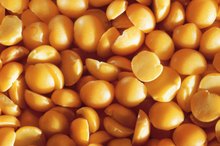Allergies and Artichokes
Artichokes are unusual-looking vegetables commonly eaten in the Mediterranean region and the Middle East. They need to be cooked to make the flesh soft enough to eat and digest. Like most plants, artichokes contain phytonutrients, plant compounds that may trigger allergic reactions in sensitive individuals. If you commonly experience allergies from plants and vegetables, ask your doctor if artichokes are safe for you to eat.
If you are experiencing serious medical symptoms, seek emergency treatment immediately.
Artichokes
Artichokes are indigenous to southern Europe and regions surrounding the Mediterranean Sea, and their cultivation dates back thousands of years. Artichokes are actually the flowers of a variety of related plants that produce edible buds. They grow between 3 and 6 inches in diameter and are covered in numerous triangular scales. The edible portions of the buds are the lower sections, which are fleshy and known as the artichoke heart. Artichokes are nutritious vegetables, with the leaves, stem and roots used to make medicinal extracts.
- Artichokes are indigenous to southern Europe and regions surrounding the Mediterranean Sea, and their cultivation dates back thousands of years.
- Artichokes are nutritious vegetables, with the leaves, stem and roots used to make medicinal extracts.
Potential Remedies
Does a Cut-Up Onion Clear Sinuses?
Learn More
Artichokes have traditionally treated many health ailments. They are exceptionally rich in plant compounds that act as powerful antioxidants, eliminating potentially harmful free radicals from your body. Artichokes are not commonly used to combat allergy symptoms, and in fact may induce allergic reactions in some people.
Allergic Reaction
Artichokes and artichoke extracts are considered safe in moderate amounts, although some people are allergic to plant compounds in artichokes and related species. 2”
Allergy Symptoms
Allergy to Lentils
Learn More
A severe allergic reaction can become a medical emergency if it leads to anaphylaxis and shock, so take caution if you have allergies to other plants. Other potential negative reactions to artichokes, although not considered allergic, include intestinal gas, abdominal pain and aggravation of gallstone symptoms due to increased bile flow.
Related Articles
References
- Principles and Practice of Phytotherapy: Modern Herbal Medicine; Simon Mills and Kerry Bone
- Herbs that Heal: Prescription for Herbal Healing; Michael and Janet Weiner
- Artichokes, (globe or french), boiled, without salt. FoodData Central. U.S. Department of Agriculture. Published April 1, 2019.
- Crider KS, Qi YP, Devine O, Tinker SC, Berry RJ. Modeling the impact of folic acid fortification and supplementation on red blood cell folate concentrations and predicted neural tube defect risk in the United States: have we reached optimal prevention?. Am J Clin Nutr. 2018;107(6):1027–1034. doi:10.1093/ajcn/nqy065
- Kirkland AE, Sarlo GL, Holton KF. The role of magnesium in neurological disorders. Nutrients. 2018;10(6):730. doi:10.3390/nu10060730
- Negro D, Montesano V, Grieco S, et al. Polyphenol compounds in artichoke plant tissues and varieties. J Food Sci. 2012;77(2):C244-52. doi:10.1111/j.1750-3841.2011.02531.x
- Anderson JW, Baird P, Davis RH, et al. Health benefits of dietary fiber. Nutr Rev. 2009;67(4):188-205. doi:10.1111/j.1753-4887.2009.00189.x
- Burnier M. Should we eat more potassium to better control blood pressure in hypertension?. Nephrol Dial Transplant. 2019;34(2):184-193. doi:10.1093/ndt/gfx340
- Sahebkar A, Pirro M, Banach M, Mikhailidis DP, Atkin SL, Cicero AFG. Lipid-lowering activity of artichoke extracts: A systematic review and meta-analysis. Crit Rev Food Sci Nutr. 2018;58(15):2549-2556. doi:10.1080/10408398.2017.1332572
- Rondanelli M, Monteferrario F, Perna S, Faliva MA, Opizzi A. Health-promoting properties of artichoke in preventing cardiovascular disease by its lipidic and glycemic-reducing action. Monaldi Arch Chest Dis. 2013;80(1):17-26. doi:10.4081/monaldi.2013.87
- Liguori I, Russo G, Curcio F, et al. Oxidative stress, aging, and diseases. Clin Interv Aging. 2018;13:757-772. doi:https://doi.org/10.2147/CIA.S158513
- Carr AC, Maggini S. Vitamin C and immune function. Nutrients. 2017;9(11):1211. doi:10.3390/nu9111211
- D'Antuono I, Carola A, Sena LM, et al. Artichoke polyphenols produce skin anti-age effects by improving endothelial cell integrity and functionality. Molecules. 2018;23(11). doi:10.3390/molecules23112729
- Rodríguez-Olleros Rodríguez C, Díaz Curiel M. Vitamin K and bone health: A review on the effects of vitamin K deficiency and supplementation and the effect of non-Vitamin K antagonist oral anticoagulants on different bone parameters. J Osteoporos. 2019;2019:2069176. doi:10.1155/2019/2069176
- Lattanzio V, Kroon PA, Linsalata V, Candinali A. Globe artichoke: A functional food and source of nutraceutical ingredients. J Funct Foods. 2009;1(2). doi:10.1016/j.jff.2009.01.002
- Mileo AM, Di Venere D, Abbruzzese C, Miccadei S. Long term exposure to polyphenols of artichoke (Cynara scolymus L.) exerts induction of senescence driven growth arrest in the MDA-MB231 human breast cancer cell line. Oxid Med Cell Longev. 2015. doi:10.1155/2015/363827
- Pulito C, Mori F, Sacconi A, et al. Cynara scolymus affects malignant pleural mesothelioma by promoting apoptosis and restraining invasion. Oncotarget. 2015;6(20):18134-50. doi:10.18632/oncotarget.4017
- Grundmann O, Yoon SL. Complementary and alternative medicines in irritable bowel syndrome: An integrative view. World J Gastroenterol. 2014;20(2):346-62. doi:10.3748/wjg.v20.i2.346
- Macchia L, Giliberti L, Lotti A et al. Allergy to pomegranate and artichoke, novel food allergens of the Mediterranean diet. Clin Transl Allergy 2013;3:P75. doi:10.1186/2045-7022-3-S3-P75
- Denisow-Pietrzyk M, Pietrzyk Ł, Denisow B. Asteraceae species as potential environmental factors of allergy. Environ Sci Pollut Res. 2019;26:6290–6300. doi:10.1007/s11356-019-04146-w
- Welland D. Artichokes: A rich history and mild flavor. Food and Nutrition. Updated December 8, 2016.
Writer Bio
Sirah Dubois is currently a PhD student in food science after having completed her master's degree in nutrition at the University of Alberta. She has worked in private practice as a dietitian in Edmonton, Canada and her nutrition-related articles have appeared in The Edmonton Journal newspaper.









